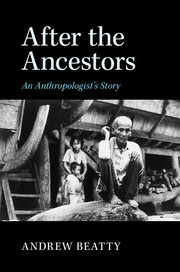Book contents
- Frontmatter
- Epigraph
- Contents
- List of illustrations
- Preface
- People
- Map
- Prologue
- 1 The statue
- 2 House key
- 3 Among women
- 4 Blood brothers
- 5 Daggers and debutants
- 6 Stormy Sunday
- 7 Three things that matter
- 8 The making of great men
- 9 A game of chess
- 10 Cholera song
- 11 Progress
- 12 Brothers and strangers
- 13 Exile and return
- 14 Field work
- 15 The chicken's neck
- 16 Good deaths and bad deaths
- 17 First family
- 18 Blessing
- 19 Half an egg
- 20 Waiting
- 21 Death of a chief
- 22 Ama Jonah at bay
- 23 Unravelling
- 24 The ethnographer and his double
- Epilogue
- Index
16 - Good deaths and bad deaths
Published online by Cambridge University Press: 05 March 2015
- Frontmatter
- Epigraph
- Contents
- List of illustrations
- Preface
- People
- Map
- Prologue
- 1 The statue
- 2 House key
- 3 Among women
- 4 Blood brothers
- 5 Daggers and debutants
- 6 Stormy Sunday
- 7 Three things that matter
- 8 The making of great men
- 9 A game of chess
- 10 Cholera song
- 11 Progress
- 12 Brothers and strangers
- 13 Exile and return
- 14 Field work
- 15 The chicken's neck
- 16 Good deaths and bad deaths
- 17 First family
- 18 Blessing
- 19 Half an egg
- 20 Waiting
- 21 Death of a chief
- 22 Ama Jonah at bay
- 23 Unravelling
- 24 The ethnographer and his double
- Epilogue
- Index
Summary
The chief was like the great house: a grand but crumbling edifice that had overshadowed the village for a lifetime. Built to an old design – what the ancestors decreed – man and house had their roots in a distant past that would live only as long as both endured. Their fading glory recalled both personal achievement and collective anonymous effort. They belonged to all. The salawa and his dwelling were a summation of value, of all that was admirable and extreme – often the same thing in Nias. When the pillars of the house, like the chief himself, gave way – perhaps this would never happen, they were as hard as stone – there would be nothing to replace them. The great forests were gone; men of his kind no longer made.
“When Our Father dies, custom is dead.” This was the secretary's opinion, an exaggeration of course. The chief hadn't invented custom, nor was he its arbiter, but who could deny he was its most evolved product? So much had gone into his making. Decades of speeches, “earth-slippery” feasts, a web of credit that spanned the Susua valley, shotgun weddings, bloody funerals, feuds and intrigues, vanquished rivals, the Dutch, the Japanese, Independence. For thirty years the village had lived in him.
The chief's passing would mark an epoch, closing a chapter of everyone's history. It would change your sense of what it meant to be a Bu'ulölö or a son or daughter of Orahua or, indeed, a Niha. And just as the chief himself was more than a mere mortal, being a part of everyone, his loss would be a collective loss, an amputation of the social body. The village world would look as different as if the great house were snatched away by fire.
All this was brought home to me by the contrasting circumstances of another death, a family tragedy that happened at around the same time.
- Type
- Chapter
- Information
- After the AncestorsAn Anthropologist's Story, pp. 227 - 240Publisher: Cambridge University PressPrint publication year: 2015



